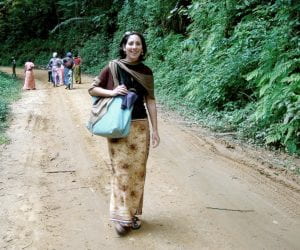Historian of modern Africa focuses on malaria eradication
 I never thought I would study Africa, work on global health topics, or even get to leave the United States. I’m a first-generation college student, and my parents didn’t have passports. As an undergraduate at UC Davis, I anticipated studying community development, but as a transfer student, all the required classes were full my first term. I signed up for an African history class on a whim. What luck for me! African history became my major and I had the opportunity to visit Africa for the first time to conduct archival research. I loved it and knew I wanted to return.
I never thought I would study Africa, work on global health topics, or even get to leave the United States. I’m a first-generation college student, and my parents didn’t have passports. As an undergraduate at UC Davis, I anticipated studying community development, but as a transfer student, all the required classes were full my first term. I signed up for an African history class on a whim. What luck for me! African history became my major and I had the opportunity to visit Africa for the first time to conduct archival research. I loved it and knew I wanted to return.
After graduating from Davis, I headed to Tanzania to work for a global health organization. I travelled all over the country seeing how health products such as male and female condoms, chlorine water treatment and bed nets were used. I learned a lot but I also had deep reservations about the global health system I was participating in. There were often gaps between what organizations wanted to do and how local people experienced them. Many things were well-intentioned but there were often unintended consequences that accrued to local populations. In my opinion, not enough attention was paid to those unintended consequences.
Dissatisfaction with the global health industry sent me back to school at Boston University. I pursued my Masters in Public Health with an emphasis on medical ethics and my PhD in African History at the same time. I spent more than a year in East Africa working in archives, conducting interviews, and observing in medical spaces. The dissertation and then book that resulted, The Experiment Must Continue: Medical Research and Ethics in East Africa (Ohio University Press, 2015) demonstrated how many of the ethical challenges we have with research aren’t new, but also vexed researchers a century ago.
This past year I was awarded an OHC Faculty Research Fellowship that provided me a term off from teaching so I could focus on my new book project on the history of failed malaria elimination attempts in Africa. The fellowship gave me time to draft a chapter of the book that focuses on the World Health Organization’s efforts in Zanzibar during the global eradication program of the 1960s. I also organized a two-hour “Archive Bootcamp” for 13 students (primarily female STEM majors) who learned the basics of archival research. Future work on this project will be funded by a 5-year National Science Foundation CAREER award. That award will enable me to involve UO students in my work as research assistants, co-authors on conference papers, and participants in my global health research group. Students will also visit archives with me in Europe and Africa. It will be an exciting five years!
Melissa Graboyes, African and Medical History, Clark Honors College;
2018–19 OHC Faculty Research Fellow